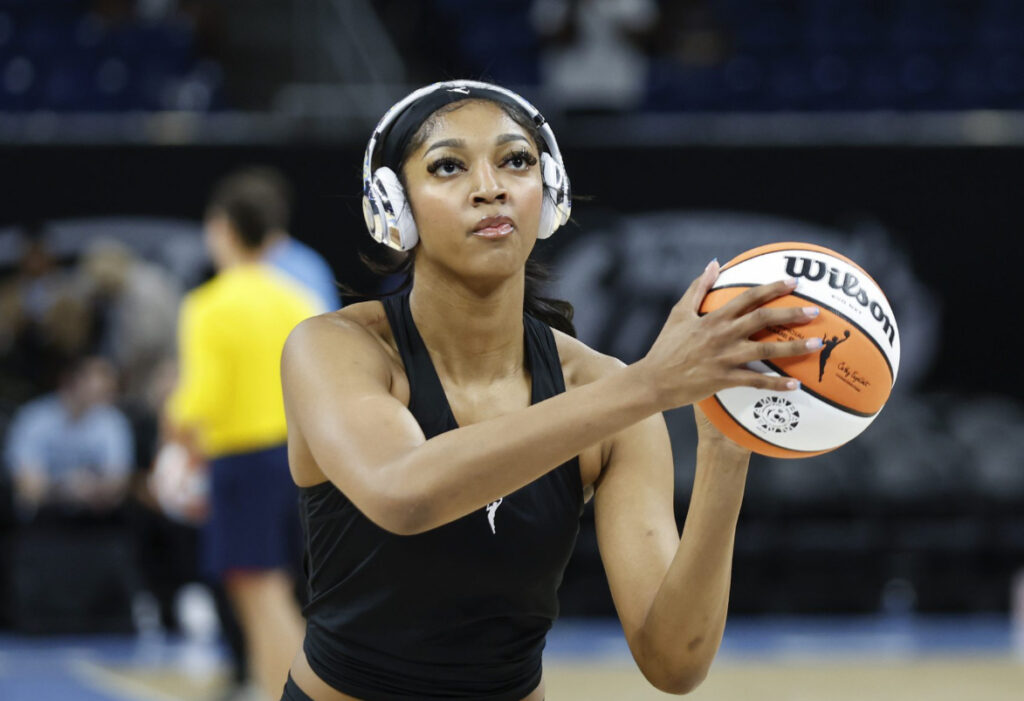In the long arc of professional sports, history does not always wait for victory. It does not always crown champions, nor does it need a spotlight. Sometimes, bequest is written in the margins—in games lost, in stats accumulated quietly but relentlessly, in grit displayed when the scoreline doesn’t flatter the effort. For Angel Reese, the Chicago Sky’s resilient centerpiece, history came not with a trophy but with a milestone etched into the record books on May 28, 2025.
Despite the Sky falling to the Phoenix Mercury, 94–89, and dropping to 0–5 on the season, Reese posted 13 points, 15 rebounds, and three steals, marking her 29th double-double in just 38 career WNBA games. But more importantly, she became the fastest player in league history to record both 500 points and 500 rebounds—a feat that redefines the narrative around her, her team, and the very expectations of a WNBA rookie.
Rewriting the Rookie Playbook
Reese’s pace is staggering. Achieving 500/500 in under 40 games surpasses the records of league legends such as Candace Parker, Tamika Catchings, and Tina Charles. And unlike many of her predecessors, who entered well-oiled franchises or at least moderately stable rosters, Reese has done this amid the turbulence of a rebuilding Chicago Sky team, struggling to find chemistry, consistency, or rhythm.
Her stat lines are not inflated by blowouts or garbage time. They are hard-earned. Every rebound contested. Every point fought for. In a league where transition speed, high-IQ passing, and refined shot selection dominate, Reese thrives on raw energy, instinct, and tenacious rebounding that borders on artistry.
This is not merely rookie excellence; it is historical disruption.
The Baltimore Blueprint: Reese’s DNA of Dominance
To understand the full magnitude of Angel Reese’s ascension, one must return to her roots. Born in Randallstown, Maryland, Reese grew up in a family that married athleticism with tenacity. Her mother, also named Angel, was a professional basketball player. Her brother, Julian, plays at the University of Maryland. But Angel was never content to simply inherit her pedigree—she amplified it.
At St. Frances Academy in Baltimore, she was already a nationally-ranked phenom. Her bold playstyle, expressive celebration, and unrelenting competitiveness made her a magnetic figure on and off the court. Her time at LSU, culminating in a national championship and Most Outstanding Player award in 2023, solidified her status not just as a college superstar but as a generational player with the charisma and skill to shape the WNBA’s future.
“Bayou Barbie” Becomes Windy City Workhorse
When the Chicago Sky selected Reese as the No. 7 overall pick in the 2024 WNBA Draft, reactions ranged from excitement to skepticism. Could her flamboyant, emotionally-charged game translate to a league marked by polished fundamentals and ruthless precision?
The answer, resoundingly, has been yes.
But Reese has also evolved. While she brought her signature bravado and social-media-ready confidence to the league, she refined her footwork, studied defensive rotations, and adjusted to the physicality and spacing of WNBA play. No longer just a post scorer, Reese now guards wings, contests perimeter shots, and draws double-teams in the paint with regularity.
Her 29 double-doubles in 38 games aren’t accidental—they’re architectural. Reese reads rebounds like a point guard reads defenses, often boxing out bigger, more experienced opponents with finesse and timing rather than brute force.
More Than Numbers: A Culture Builder in Real Time
Reese’s on-court prowess is undeniable. But her cultural impression may be even greater.
In a league constantly fighting for coverage, Reese has brought a new generation of fans—Gen Z hoop heads, young Black women, TikTok teens, and even NBA players—into the WNBA fold. She is likable yet uncompromising. Commercial yet authentic. Confident yet coachable. And in her short tenure, she’s made the Sky more than a team. She’s made them a cause.
Reese uses her platform to speak out on racial justice, gender equity, and body image—topics still often considered taboo in professional sports. She’s not afraid to address the double standards placed on expressive Black women in the game. When criticized for her celebrations or demeanor, she doesn’t apologize. She doubles down, defending joy and dominance as compatible, not contradictory.
The Sky’s Struggles and Reese’s Role in the Storm
But make no mistake: this is not a feel-good Disney narrative. The Chicago Sky are in freefall. With a record of 0–5, the season has started disastrously. A team that lost veterans in the offseason is now relying heavily on youth, including fellow rookie Kamilla Cardoso, who is still ramping up from injury, and Dana Evans, thrust into a leadership role.
In this context, Reese’s consistency becomes even more impressive. She isn’t playing with an elite point guard. She isn’t benefitting from elite spacing or second-unit blowouts. She is often the focal point of opposing scouting reports—and still produces.
The loss to the Mercury, who are building around stars like Kahleah Copper and Brittney Griner, was emblematic of this dichotomy. Reese dominated individual matchups and controlled the glass, yet the Sky faltered in transition defense and offensive cohesion. Her personal greatness seems, at least for now, insufficient to drag the team out of its rut.
Yet, these are crucibles from which superstars are forged. Not every path includes instant postseason glory. For some, legacy is carved in the tension between greatness and adversity.
Reese and the Evolution of the Modern Big
What Angel Reese represents transcends box scores. She is part of a broader evolution in what it means to be a modern WNBA big:
- Versatility: She can switch onto guards, defend in space, and handle the ball in transition.
- Pace: Her motor allows her to push tempo on rebounds and recover on second-chance plays.
- Narrative Command: Like A’ja Wilson and Breanna Stewart before her, Reese is constructing a brand narrative that intersects sport, fashion, politics, and media.
Yet Reese’s edge lies in her emotional intelligence. She plays angry, but smart. Loud, but locked-in. Her performative gestures—flexing, mean-mugging, waving off defenders—are not distractions. They are emblems of presence, asserting that dominance and joy can occupy the same moment.
Fastest to 500/500: A Metric That Matters
Let’s revisit the milestone. No WNBA player—rookie or veteran—has reached 500 points and 500 rebounds faster. This is not a vanity stat. It encapsulates durability, efficiency, consistency, and impact. It signals that Reese is not just a young talent, but one on trajectory to redefine the arc of a professional career.
Consider this: Candace Parker did not reach 500/500 until game 41. Tina Charles? Game 42. Reese did it in 38—while averaging fewer minutes and carrying a heavier rebounding load.
It’s a number, yes. But it’s also a warning shot to the league.
The Future of the Sky—and the League—Runs Through Reese
Where the Sky go from here remains uncertain. With a young core, limited cap space, and growing pressure from fans, the front office faces tough questions. But one thing is sure: the franchise has found its anchor.
In Reese, they possess a player who is not just productive but transformational. A player whose ceiling seems undefined. A player around whom systems, strategies, and even locker room culture can be built. She is not a rebuild piece—she’s a foundation stone.
And for the WNBA as a whole, her rise is catalytic. She draws crowds, trends online, and inspires a new archetype: the big who’s built for both battle and brand.
Impression
The Chicago Sky lost to the Phoenix Mercury, yes. But Angel Reese won something rarer: a foothold in the annals of the league. Her 29th double-double. Her fastest-ever 500/500. Her imprint on a game where stats can deceive but presence never lies.
She’s only getting started. And if this is what history looks like in defeat, then her eventual triumphs will be nothing short of revolutionary.
No comments yet.








